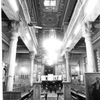Disclaimer
This entry contains information known to us from a variety of sources but may not include all the information currently available. Please be in touch if you notice any inadvertent mistakes in our presentation or have additional knowledge or sources to share. Thank you.
Archive
Etz Haim (Hanan) Synagogue at Cairo, Egypt
The Jews in Egypt flourished under British occupation during the latter portion of the 19th century. [1] Jews from all over Europe flocked to Cairo, fleeing Russian pogroms, as well as the failing Ottoman Empire. [2] Though the city welcomed the influx of Ashkenazi Jews, the older Sephardic communities laid claim to the Jewish majority in Cairo. [3] The Sephardic Hanan Synagogue, founded in 1900 by Ibrahim Youssef Hanan, sits on Qantara Ghamra Street, Army Square in Al-Zaher in the Al-Waily District in Cairo. [4] It stands as a testament to the rich Jewish life that flourished in Cairo at the turn of the century.
Description
Temple Hanan
Located in the heart of bustling Cairo, Temple Hanan functions as a calming oasis for city life. Dedicated in 1900, the synagogue sits on 3,500 square meters of land surrounded by a stone wall. [5, 6] The property contains a lovely courtyard, complete with leafy trees and a sukkah for outdoor worship. The lavish interior of the synagogue features 400 square meters of interior space. [7] The main sanctuary stuns with decorative ceilings, marble columns, and a large chandelier. A women’s balcony overlooks the main floor and gives the space an open, airy feel. Ornamental stone engravings surround the rich, wooden door to the ark. A separate entrance off of the main sanctuary leads to a Yeshiva, founded in 1947 and renovated in 1952. [8] The property also contains a ritual pool (mikvah), a communal sukkah, and rooms for a caretaker/beadle. [9] In fact, it has been said that the Muslim caretaker still remembers the prayers and sings them to tourists who visit the Temple. [10, 11] Though the property remains in disrepair, it is easy to recognize the quiet beauty of this important synagogue. It remains a beacon of Jewish modern architecture. [12] The Hanan synagogue was dedicated in 1900. Besides the sanctuary, the synagogue compound also contains the Yeshiva of Rabbi Yehuda Maslaton (AKA Teboul Yeshiva), a ritual pool (mikveh), a communal sukkah, and rooms for the caretaker/ beadle.
Sources
Notes
[1] Elinoar Bareket and Racheline Barda, “Egypt”, in Encyclopedia of Jews in the Islamic World, Executive Editor Norman A. Stillman, first published online: 2010, consulted online on 15 June 2018.
[2] Ibid.
[3] Jacob M. Landau, “Cairo”, in Encyclopedia of Jews in the Islamic World, Executive Editor Norman A. Stillman, first published online: 2010, consulted online on 15 June 2018.
[4] Samar Samir, “Fallen from Grace: Rabbi Hayyim El-Imshati Synagogue,” Egypt Today, December 30, 2017, accessed June 13, 2018, https://www.egypttoday.com/Article/4/38844/Fallen-from-Grace-Rabbi-Hayyim-El-Imshati-Synagogue.
[5] Sven Baruchel, “Synagogues,” Association Internationale Nebi Daniel, http://www.nebidaniel.org/synagogues.php?lang=en.
[6] Samar Samir.
[7] Ibid.
[8] Ibid.
[9] Meital, Yoram. Atarim Yehudiim Bemisrayim (Hebrew. Jewish sites in Egypt), Yad Ben Zvi, 1995, p. 73.
[10] "Etz Hayim Synagogue,” JIMENA Egyptian Experience, accessed June 13, 2018, http://jimenaexperience.org/egypt/portfolio/etz-hayim-synagogue/.
[11] Levana Zamir, “The golden era of the Jews of Egypt and the Mediterranean option for a united Middle East,” University of Haifa, 2008.
[12] Samar Samir.
Works Cited
Bareket, Elinoar and Racheline Barda. “Egypt.” In Encyclopedia of Jews in the Islamic World. Executive Editor Norman A. Stillman. First published online: 2010. Consulted online on 15 June 2018.
"Etz Hayim Synagogue.” JIMENA Egyptian Experience. Accessed June 13, 2018, http://jimenaexperience.org/egypt/portfolio/etz-hayim-synagogue/.
Landau, Jacob M. “Cairo.” In Encyclopedia of Jews in the Islamic World. Executive Editor Norman A. Stillman. First published online 2010. Consulted online on 15 June 2018.
Meital, Yoram. Atarim Yehudiim Bemisrayim. Yad Ben Zvi, 1995.
Samir, Samar. “Fallen from Grace: Rabbi Hayyim El-Imshati Synagogue.” Egypt Today. December 30, 2017. Accessed June 15, 2018. https://www.egypttoday.com/Article/4/38844/Fallen-from-Grace-Rabbi-Hayyim-El-Imshati-Synagogue.
Zamir, Levana. The golden era of “the Jews of Egypt” and the Mediterranean option for a united Middle East. University of Haifa, 2008.
Photos
Radovan, Zeev. "Interior. Photograph of: Interior of Hanan (Etz-Haim) Synagogue in Cairo." 1984. From the collection of the National Library of Israel, courtesy of The Center for Jewish Art.
Radovan, Zeev. "Street view. Photograph of: Hanan (Etz-Haim) Synagogue in Cairo." 1984. From the collection of the National Library of Israel, courtesy of The Center for Jewish Art.
Radovan, Zeev. "Inner yard. Photograph of: Hanan (Etz-Haim) Synagogue in Cairo." 1984. From the collection of the National Library of Israel, courtesy of The Center for Jewish Art.
Radovan, Zeev. "Inner yard. Photograph of: Hanan (Etz-Haim) Synagogue in Cairo." 1984. From the collection of the National Library of Israel, courtesy of The Center for Jewish Art.
Radovan, Zeev. "Interior. Photograph of: Interior of Hanan (Etz-Haim) Synagogue in Cairo." 1984. From the collection of the National Library of Israel, courtesy of The Center for Jewish Art.
Radovan, Zeev. "Inner yard. Photograph of: Hanan (Etz-Haim) Synagogue in Cairo." 1984. From the collection of the National Library of Israel, courtesy of The Center for Jewish Art.
Radovan, Zeev. "Inner yard. Photograph of: Hanan (Etz-Haim) Synagogue in Cairo." 1984. From the collection of the National Library of Israel, courtesy of The Center for Jewish Art.
Radovan, Zeev. "Exterior, Entrance. Photograph of: Hanan (Etz-Haim) Synagogue in Cairo." 1984. From the collection of the National Library of Israel, courtesy of The Center for Jewish Art.




























